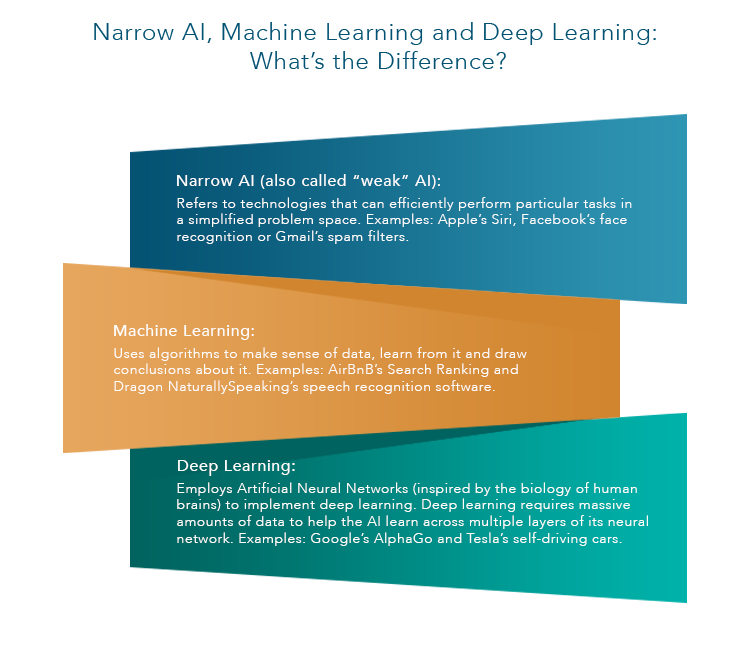I did an amusing and highly informal survey, asking various people in my life what they think about when I mention “artificial intelligence” (AI). Not surprisingly, most think of human-like robots or omniscient, self-aware computer systems as portrayed in The Terminator, Ex Machina or Person of Interest. There’s the unavoidable association with a dystopian future in which the machines wake up and decide humans are a blight that must be eradicated. Even luminaries like Stephen Hawking and Elon Musk have warned us of the potential dangers of AI. But the general public still seems to think of AI technology as something to worry about in the distant future, not something that’s already a factor in almost every industry and aspect of our everyday lives.
The truth is that AI is already here, and it’s pervasive. Though most AI tech is nowhere near passing the Turing Test and taking over the world, it’s absolutely already transforming the way we do business. Whether they consider AI technology to be a friend or a foe, many B2B marketing leaders see the potential—and the inevitability—of AI. In fact, most CMOs in five global markets believe artificial intelligence will surpass social media's influence in the industry. Nearly six in 10 believe that within the next five years, companies will need to compete in the AI space to succeed.
The Dawn of the Cognitive Era
Joanna L. Batstone, PhD, Vice President and Lab Director at IBM Research Australia and Chief Technology Officer, IBM Australia and New Zealand, says those involved in serious information science understand the enormous potential of intelligent systems.
“Cognitive computing systems learn at scale, reason with purpose and interact with humans naturally,” Batstone explains. “They learn and reason from their interactions with us and their experiences with their environment.”
Intelligent systems can go beyond answering numerical problems to offer hypotheses, reasoned arguments and recommendations. However, Batstone reassures anyone who might still be nervous about the nature of AI.
“None of this involves autonomy on the part of machines. Rather, it consists of augmenting the human ability to harness technology in the pursuit of knowledge, to further our expertise and to improve the human condition,” she says. In fact, cognitive computing represents not just a new technology, but the dawn of a new era of technology, business and society. Batstone dubs this new era the Cognitive Era.
In marketing, cognitive systems are making predictive and anticipatory modeling possible. Predictive modeling takes large amounts of customer firmographic information, behavioral data and other inputs and uses it to make educated guesses about what customers are likely to do and want next based on their past behaviors and the decisions of other buyers similar to them. This is what online retailers use to show you products and services you didn’t know you wanted or needed until it’s served up to you as a personalized offer you can’t resist.
In B2B marketing, organizations are using anticipatory AI tools, which synthesize a very broad swath of internal and external inputs and actually “learn” from trends to identify instrinsic state changes in companies. They use AI software to sift through massive amounts of customer data to identify and target companies entering particular stages of growth or decline, predict buyer behaviors, monitor and react to social media conversations, even generate original content based on user input, search patterns and behaviors.
AI Is as Much About “Nurture” as “Nature”
But don’t worry, AI marketing (AIM) isn’t putting human marketers out of work anytime soon. Instead, it has the potential to be the connective tissue among martech systems, augmenting humans’ ability to make sense of and take action on data.
Wayne Sadin, Chief Digital and Information Officer at Affinitas Life, says, “Humans are still very much driving the train. It’s just a much faster, more powerful train now.”
Sadin urges marketers to rely on machine learning to perform rote tasks (like watching social media posts) in order to free teams to do higher-level creative work. By interconnecting social data to web analytics to a CRM database to external data and more, B2B marketers can use AI applications to automate and personalize many interactions that used to be time-intensive and far less efficient.
For this reason, Sadin thinks of the “A” in “AI” as augmented instead of artificial. “AI is part of the trend towards ‘Augmented Everything’: brains (AI), muscles (robots), vision (AR/VR),” Sadin says. “It makes workers smarter, stronger and faster. It’s not some central overlord machine, though. It’s just smart people taking advantage of data that’s already there and intelligent martech that is getting more and more capable of adapting to changing customer behaviors and expectations.”
Sadin cautions that AI has to be carefully nurtured and guided. It can only do what we tell it to do and learn what we tell it to learn. AI can’t connect data and martech systems on its own without a human telling the technology how to make the connections and what to do with the data it takes in. (Maybe Maciej Ceglowski puts it best: “I find it helpful to think of algorithms as a dim-witted but extremely industrious graduate student, whom you don't fully trust.”)
To train AI apps to be genuinely useful and not just more chaos cluttering up the martech landscape, we have to tie machine learning to business goals and ethical standards and be very, very specific about the data we feed into the AI to train it. We have to set limits and maintain good data hygiene so the AI makes the connections we want and stays on track. Without reasonably clean, complete data, AI is just garbage in, garbage out. And without encoding careful ethical parameters to nurture the AI’s learning and development.

AI Marketing Requires a Different Mindset
AI is already proving to be more of a friend than a foe to B2B marketers. To get the desired results, though, not only do marketers have to properly nurture AI technologies, we also have to embrace their potential—even when there’s the possibility that AI will eventually render our current jobs obsolete.
Paul Greenberg, independent consultant and author of the best-selling book CRM at the Speed of Light, points out that marketers have to embrace a very different mindset moving forward. Marketers are trained to target personas—representations of broad groups of people with similar characteristics and drivers—and produce content that appeals to them. But now customers expect an extremely high level of personalization and real-time interactions with brands across a multitude of devices and channels.
To this end, most marketers are still producing their own content, but eventually it simply won’t be possible to produce enough personalized content fast enough without AI. There are already applications that can draw on interconnections among systems of engagement to generate stories with natural language in a very human-like tone with personality. It’s worth noting these applications demonstrate varying degrees of effectiveness (Columbia research finds people think human-written articles are “more readable,” but computer-generated stories are “more credible”).
These technologies will nevertheless grow in popularity. Greenberg expects these applications to be acquired by, and absorbed into, big marketing clouds like IBM, Oracle and Salesforce, so you should expect to see them soon in your martech portfolios if you don’t have them already.
As for what we can and should expect AIM technology to do today and in the future, Greenberg points to one of his favorite marketing videos of the past few years, Corning’s “A Day Made of Glass.” This video was not produced using AI, but it’s the kind of thing Greenberg believes we can and should be leveraging AI to create. He says the Corning video brilliantly connects with consumers’ emotions to create a human-centric vision of the future with extremely broad appeal.
“AIM technology can already do this if we ask it to. It’s not way off in the future,” Greenberg says. “Intelligent systems can already make the connections between systems of record and systems of engagement to understand what would emotionally engage people. These technologies can independently test and learn from people’s reactions enough to change their approach and build highly personalized, relevant and contextual custom content for prospects and customers in real time.”
So is AI a friend or a foe to B2B marketers? The answer is yes. AI is what you make it. It all goes back to how you feed, nurture and train your intelligent systems. Just as you wouldn’t toss a five-year-old child into a mosh pit to learn how to dance, you can’t leave AIM technology on its own to learn from unlimited inputs and “dirty” data sources. If you train it well and use it to build interconnections across your organization and beyond, AIM can significantly augment your human marketing team’s capabilities to anticipate and connect with much larger and more diverse audiences over time.

